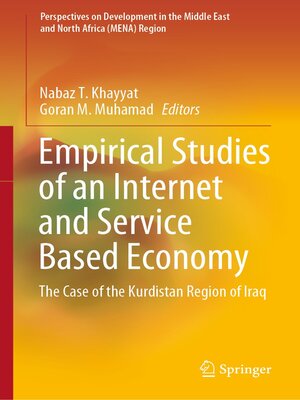Empirical Studies of an Internet and Service Based Economy
ebook ∣ The Case of the Kurdistan Region of Iraq · Perspectives on Development in the Middle East and North Africa (MENA) Region
By Nabaz T. Khayyat

Sign up to save your library
With an OverDrive account, you can save your favorite libraries for at-a-glance information about availability. Find out more about OverDrive accounts.
Find this title in Libby, the library reading app by OverDrive.



Search for a digital library with this title
Title found at these libraries:
| Loading... |
This book is a collection of eight studies covering several areas pertinent to the current technological and banking services situation in the Kurdistan region of Iraq. The economy of the Kurdistan Region of Iraq (KRI) is mainly dependent on oil revenue. The oil export revenue constitutes more than 90% of the government's fiscal revenue. In addition to that, the public sector plays an excessive role in the economy, with public spending to GDP being over 70% while revenue from taxation constitutes less than 30% of total revenue.
As the economy is not diversified, there is a large gap between demand and supply of locally produced tradeable goods, leaving the KRI economy highly dependent on imports. Another structural challenge of the KRI economy is its dependence on cash and a weekly financial system. Although the region has witnessed extraordinary economic growth from 2008 to 2014, the growth rate decreased from 8 to 1 percent, trade and investment dropped to 5 percent, and the unemployment rate significantly increased to over 20% by the end of the year 2019. To maintain the progress of economic development, it is necessary to upgrade the country's industrial structure in order to be able to generate more value-added products, which requires advancement in technological infrastructure to employ more sophisticated technologies.
There is not much written about Kurdistan and its economy, and yet there is a comprehensive development plan and resources to be used for education, research, rehabilitation, development, and reconstruction. As such, this book would be of interest to researchers, decision-makers, governmental and non-governmental organizations, undergraduate and graduate students, and the general public with an interest in the Middle East and contemporary Kurdish issues. It is a good up-to-date handbook for policymakers and NGOs involved in the rehabilitation, reconstruction, and development of Iraq.






